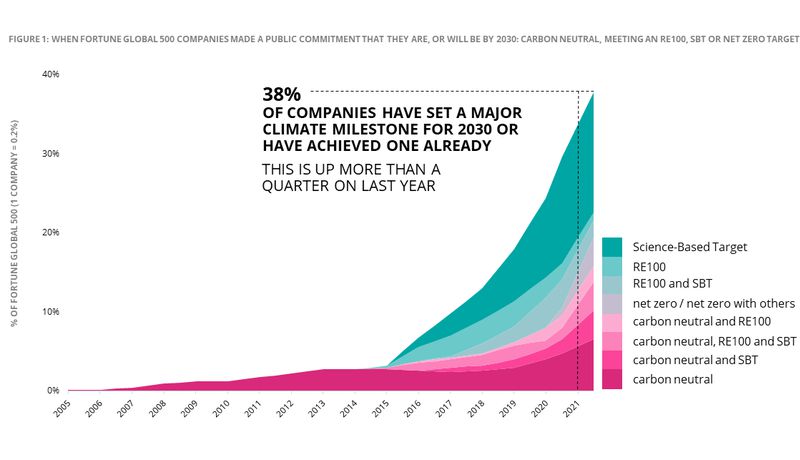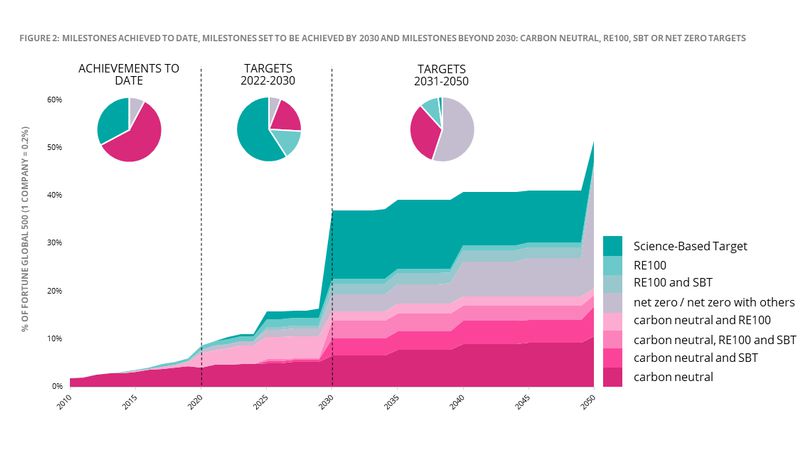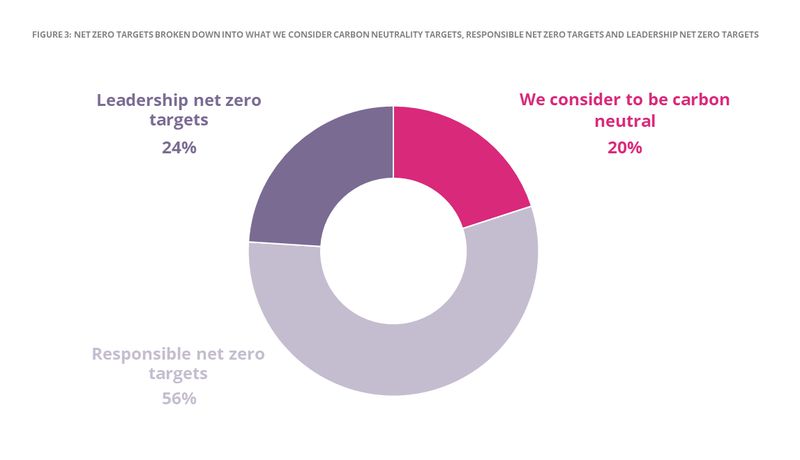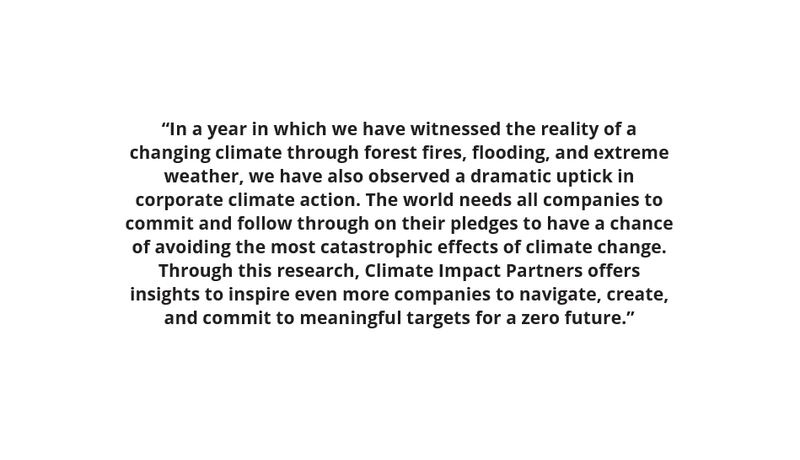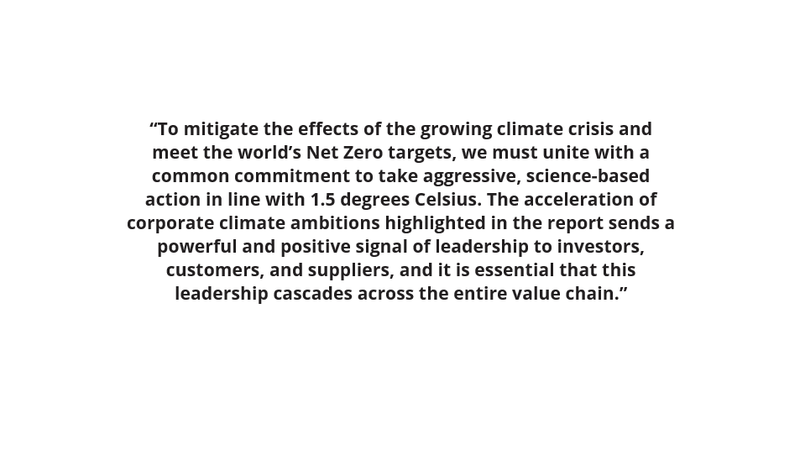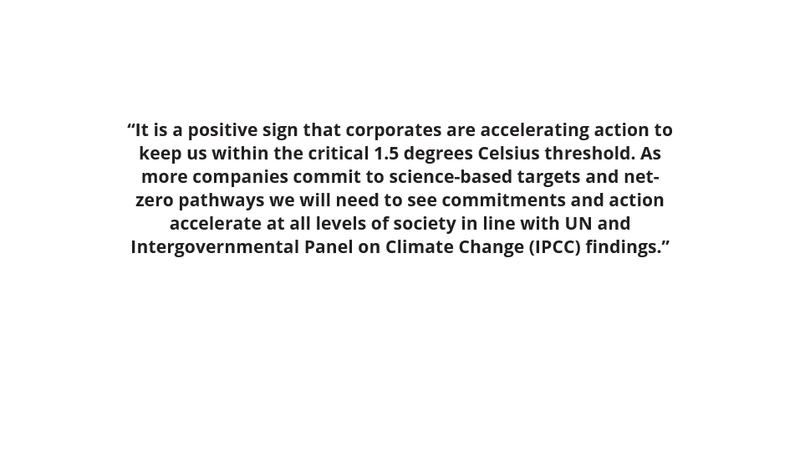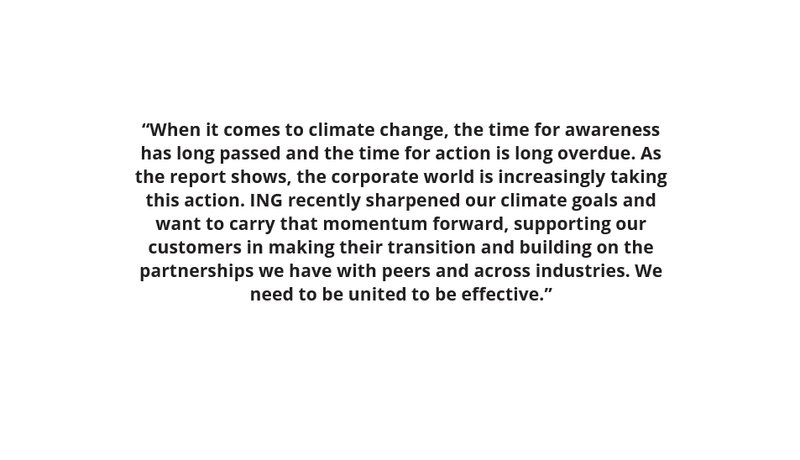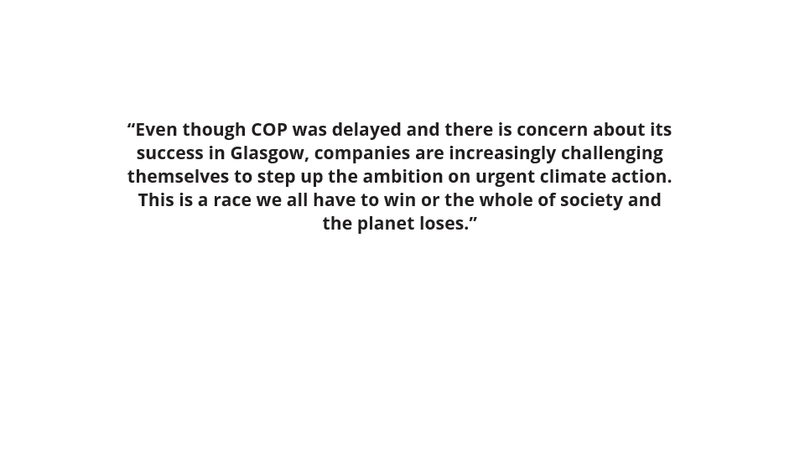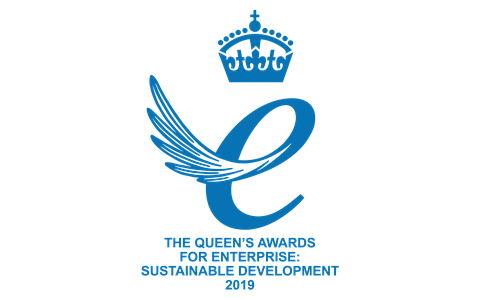THE THIRD ANNUAL STUDY TO ASSESS HOW FORTUNE GLOBAL 500 COMPANIES HAVE INCREASED THEIR CLIMATE ACTIONS AND COMMITMENTS
In the past year, the world has been reshaped. More extreme weather events have been linked more clearly than ever to climate change, most notably outlined in the latest IPCC report, and the prolonged global response to the Covid-19 pandemic has highlighted the challenges to tackling large-scale global problems in ways which are coordinated, equitable and urgent. Covid-19 has made it clear that companies are dependent upon government policy and action.
When it comes to climate, the last year has seen the world pass an important milestone: a majority of people now live in countries with net zero targets. But disharmony, distrust and blame between governments, and a continuing lack of political and financial capital for leaders to spend on climate change domestically, means that the prospect of transformative, binding near-term action from governments still seems hopeful at best.
It’s not just political leaders that are being scrutinized as to whether their long-term targets present more than the illusion of climate action. While companies are stepping in, they are also under scrutiny. Customers, employees, regulators and investors are questioning companies about possible greenwashing and stakeholder-washing, those in the financial sector are accused of ESG-washing. Corporate leaders are being asked whether their plans, practices and policies match up to their rhetoric and long-term goals.
The stakes are high.
For the third year in a row, we have investigated how the world’s largest companies are leaning into the effort of tackling climate change.
Our research finds that increasingly the world’s largest companies are leaning in to the collective requirement to tackle climate change, with 38% having a significant milestone set for 2030, up eight percentage points from last year.
There has been a three-fold increase in net zero targets (albeit from a low base and mostly with distant achievement dates), a 50% increase in the number of companies that have either achieved carbon neutrality or are targeting it by 2030, and a 25% increase in science-based targets.
By breaking out net zero and carbon neutral commitments, we can see that many companies are using the two approaches in tandem.
The vast majority (86%) of companies with a net zero target have set them after 2030. One third of those companies with a net zero target are either carbon neutral already or have a more immediate carbon neutrality target.
Looking at net zero targets, we consider 20% not to be fully aligned with the emerging consensus around how net zero is defined and would consider these as closer to carbon neutrality targets on the basis of not covering value chain emissions.
We consider 56% of net zero targets as responsible net zero targets, with a target date in line with the government target for net zero where they are headquartered, or the Paris Agreement if there is no national target.
We consider 24% of net zero targets as leadership net zero targets, accelerating ahead of the national target for net zero where they are headquartered, or the Paris Agreement if there is no national target. This is an important distinction to make: net zero targets can’t be considered as corporate climate leadership if they are the law of the land.
While there has been an encouraging growth in actions and commitments, we must be mindful not to exaggerate the progress: Over 60% of companies are not committed to deliver a meaningful climate milestone by 2030.
But our research shows that there is a significant and growing group of the world’s largest companies for which progress and profit can live together and who believe you can be in the business of bettering the world.
Methodology
We looked at the Fortune Global 500 because it serves as a large and representative sample of the private sector as a whole. Fortune Global 500 companies have combined revenues of $32 trillion and employ 70 million people around the world. (For reference, the total GDP of the U.S. is $21 trillion).
In addition to the importance of climate action within their own operations, these companies have significant influence on their suppliers, customers and the wider world of business and government.
The research looked at the following four publicly-available climate actions of the Fortune Global 500 companies:
- Carbon neutrality
- Net zero
- RE100 (100% renewable electricity)
- Science Based Targets (SBTs)
We also chose to look at whether companies are already meeting those commitments or are publicly committed to achieve them by 2030, the IPCC’s key deadline for getting on the path that limits the global average temperature rise to 1.5 degrees Celsius.
Corporate climate action and 2030 commitments are up a quarter in a year
38% of companies in the Fortune Global 500 have delivered a significant climate milestone or are publicly committed to do so by 2030, up by eight percentage points from last year. This has mostly been driven by a 50% increase in the number of companies that have either achieved carbon neutrality or are targeting it by 2030, and by a 25% increase in Science Based Targets (SBTs).
Carbon neutrality, SBTs and net zero are often being used in combination by companies, but over different time horizons
Carbon neutrality (59%) leads the milestones achieved to date, SBTs (59%) lead the milestones set to be achieved before the end of this decade, and net zero (55%) lead the milestones beyond 2030.
Net zero has arrived as a major pillar of corporate climate action, but confusion over definitions means it is not quite that simple
Carbon neutrality (59%) leads the milestones achieved to date, SBTs (59%) lead the milestones set to be achieved before the end of this decade, and net zero (55%) lead the milestones beyond 2030.
The number of companies with a net zero target has trebled in a year: up to 25% of companies from 8% of companies a year ago.
86% of these net zero targets are set for further out than 2030. 52% of these companies with a net zero target have set a Science-Based Target, and one third of companies with a net zero target have a more immediate carbon neutral target/achievement.
We consider 20% of net zero targets to be not fully aligned with the emerging consensus around how net zero is defined and would consider these as closer to carbon neutrality targets on the basis of not covering value chain emissions.
We consider 56% of net zero targets as responsible net zero targets, with a target date in line with the government target for net zero where they are headquartered, or the Paris Agreement if there is no national target.
We consider 24% of net zero targets as leadership net zero targets, accelerating ahead of the national target for net zero where they are headquartered, or the Paris Agreement if there is no national target.
We asked some of our Fortune Global 500 clients for their reaction to the research.
To read more findings, understand our methodology, or access the full data set, please download below.
The world’s largest companies are leaning in to the collective requirement to tackle climate change. 38% now have a significant climate milestone set for 2030, up eight percentage points from last year.
Dernières actualités

New test article 2023
A dummy article to test title issue.
Pour en savoir plus
FR Test News Article
Article test en français
Pour en savoir plus
Natural Capital Partners and ClimateCare become Climate Impact Partners
Natural Capital Partners and ClimateCare become Climate Impact Partners and sets goal of delivering 1 billion tonnes of emission reductions by 2030.
Pour en savoir plus
FR Climate Impact Partners expands project development team with Nature-Based Solutions expert
FR Frank Carroll, the forester and forest investment specialist, has joined Climate Impact Partners.
Pour en savoir plus50% The increase in the number of companies that have either achieved carbon neutrality or are targeting it by 2030.
The acceleration of corporate climate ambitions highlighted in the report sends a powerful and positive signal of leadership to investors, customers and suppliers.
Les toutes dernières Insights de
Climate Impact Partners

10 idées reçues à abandonner sur la compensation carbone
10 idées reçues à abandonner sur le net zéro et la compensation carbone.
Pour en savoir plus
FR Test insight article
Testing all plug-ins in 2 column format for French
Pour en savoir plus
FR - Innovation test insight article
As carbon markets grow and innovate how can Web 3.0 be harnessed in a positive way to build scale and impact?
Pour en savoir plus

